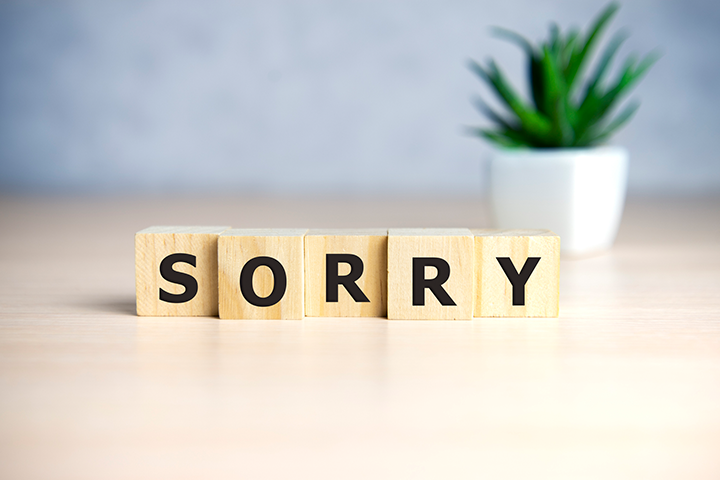We say something along the lines of "I'm just human" when we make a mistake. We're indicating that everyone makes mistakes, which makes what we did was okay. That's great, as long as we take personal responsibility for our errors.
We don't want to feel bad about ourselves, so making amends is difficult. Our urge to create a positive image of ourselves might make real apologies difficult.
When we are unwilling to accept responsibility for our mistakes and apologise to others when necessary, it can have a severe impact on every aspect of our lives, including our job, the classroom, and our personal relationships. It can also prevent us from growing and learning from our experiences. A sincere apology can go a long way. It doesn't matter if we hurt someone by intent or by mistake; we must take responsibility. By admitting our mistakes, we have the potential to restore trust, validate experiences, and heal scars. We reduce the relationship's safety and, as a result, increase the harm when we fail to take responsibility for our actions.
The word “sorry”
The word sorry is a very old word connects with feelings. It is connected to sorrow and many other old words from English, German and variety of cultures all over the world. We use sorry to convey our feelings, when we make a mistake and when we sometimes have to politely say no and reject something. So, I will focus on mistakes which are very common in a day-to-day life.
We live in a very VUCA world, things are not in our control and we will make mistakes. Sometimes, we don’t want to own our mistake and say sorry and that is a problem.
Useful Resources: communication skills courses | best leadership communication courses
The reasons why we don’t say sorry
The reason why we don’t say sorry is that, when we make a mistake culturally everybody judges us as an incompetent person and we don’t like to be judged as an incompetent person. The second big reason is the companies, classrooms and leadership studies require you to say sorry, it’s a sign of humility, strength, vulnerability but the moment you say sorry somebody in your organization will document it that you made a mistake put it in your performance management system which makes you think ‘if I say sorry then am weak and I will be the scapegoat for the whole organization which is many times the case’.
So if you are a manager and if you have teams please realize your company should have culture where apology or sorry should be encouraged as it creates a positive environment but if you are going to record it and put it their performance management system nobody’s going to do it and you will have a toxic culture and the last is we don’t say sorry because it hurts our ego; meaning we don’t want to say sorry, why would we and this is where arrogance attitude comes in.
Why is it important to say sorry?
Many of us don’t realize that we don’t want to say sorry because of our ego, but it has a very bad impression on others and this is where we should focus on how we can say sorry; why is it important to say sorry. The two big reasons why we should say sorry is that one; it’s a signoff strength and leadership skill it is not a sign of incompetence or weakness. If you have made a mistake, instead of justifying just say that you are sorry and fix it; your ability to make sure that this mistake is closed, that is competence and it is appreciated; the world loves it. We all make mistakes, for instance you cannot have a resume with zero mistakes, so what should be done is to feel very empowered to use sorry when a mistake is made but make sure that you don’t make the same mistake twice. The second reason is that when we say sorry to someone, we are giving a sign that they are important to us, their relationship is important is us, so it’s a sign of collaboration and trust. Trust increases when two people come together when we ask for sorry if we did any mistake.
How do we say sorry?
So how do we say sorry? when we made a mistake, lets first own the mistake and make sure that when you say sorry, you mean it. Our non-verbal cues plays a very crucial role in this; the face and the tone have to convey that you’ve made a mistake, the other person should feel that you mean those words as it is not theatre but human values. The first sentence has to be said with that emotion and the word sorry should be spelled very clearly. Then go on to next sentence which can capture how your mistake has made the other person feel. For instance, am really sorry for my mistake, I can only imagine that has caused you frustration and disappointment’, as now we are empathizing with the person. So, try and say a second sentence which has an empathy of how your mistakes has harmed or impacted the other person and the third sentence is here’s what you will do to mend it.
If we follow this, we can convey a signal to the world that we are a strong leader, we are not scared of making mistakes and owning them and we are also a person who will fix it and make sure that we don’t make the same mistake again. The last important thing is, saying sorry is telling the other person that they are important for you, “I value you”. Sorry is a sign of leadership and don’t let your ego come in between your way to say sorry.
Read More :
How to deal with criticism better
Style or substance – what is more important in oral communication?




















